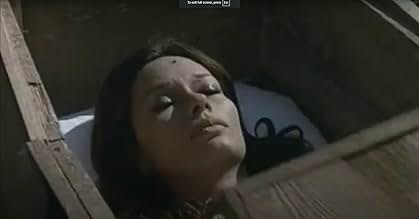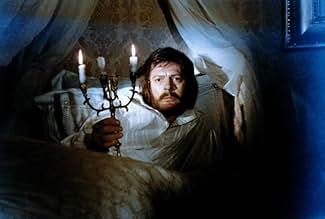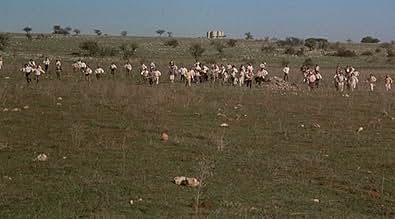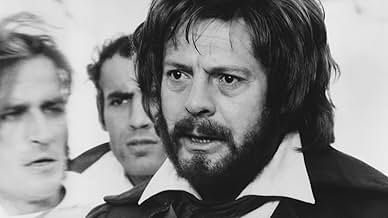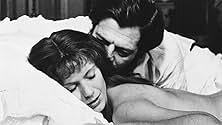IMDb RATING
7.0/10
1.4K
YOUR RATING
A anarchist leader (Fulvio) wishes to retire, as he is old and tired. He tries to hide himself, but his friends find him and insist he carries on helping them.A anarchist leader (Fulvio) wishes to retire, as he is old and tired. He tries to hide himself, but his friends find him and insist he carries on helping them.A anarchist leader (Fulvio) wishes to retire, as he is old and tired. He tries to hide himself, but his friends find him and insist he carries on helping them.
- Directors
- Writers
- Stars
- Awards
- 3 nominations total
- Directors
- Writers
- All cast & crew
- Production, box office & more at IMDbPro
Featured reviews
This movie is a quite open metaphor for the attitude of many leftists in Italy (and elsewhere) in the 70s. It's about Fulvio, a man who left his house and loving and wealthy family (and also an illegitimate son) in order to free the poor and oppressed and to become a full-time revolutionary agitator, and who - after only 3 months in prison and the suicide of a comrade - decides that it was all a mistake and that he should go back and live with his brother and sister in their villa, where he is pampered by old, mama-like servants, seeking happiness in family life. But his past thwarts his project, first when his ex-lover (an emancipated, passionate, Hungarian revolutionary woman, beautifully played by Lea Massari) appears at his home, mocking his family and shocking the servants with her manners, then when the whole bunch of revolutionary, Utopian friends of Fulvio tries to involve him in a crazy plan: initiate a revolution in poor, backward, oppressed Southern Italy. Fulvio gets involved in the plot against his will. The more he tries to get away from his former comrades, the more - ironically - he gets deep into the plot, till the sad, grotesque end. Taking place during the Restoration which followed the fall of Napoleon and seemed to mark the defeat of ideals created by the French Revolution, the movie is a bitter reflection about the fact that in everyone, even in the most revolutionary and idealist persons, there is a part which is counter-revolutionary and anti-idealistic. Fulvio is willing to betray his friends and comrades in order to live a quiet life, having lost every interest and hope in fighting injustice and oppression. It's a movie about political engagement and the following delusion, about a suicidal courage in pursuing ideas which are absolutely unrealizable and the cowardice of those who just want to enjoy life (as long as they are on the sunny side of it...), about individualism and blind dedication to THE cause and to the party/group/revolution etc. It's a sad movie in which the main figures oscillates between appeasement with the existing injustice (Fulvio's private, inner Restoration) and empty, finally pointless revolutionary beau gestes (like his comrades). We follow Fulvio and his friend from a lovely, rich Lombardy (with its villas, lakes, hills), in which men and Nature seem to harmonize perfectly, to a bare, sun battered countryside of Southern Italy (with its extremely poor towns), in which the unnaturally red jackets of the revolutionaries stand out as something which do not belong there at all. When still in Lombardy, Fulvio seeks villas and palaces, but his friends force him always to go to abandoned places, ruins, warehouses. They offer him nocturnal bivouacs instead of well furnished dining rooms like the one he brings once his illegitimate son. But they act in the name of an ideal, he in the name of his individual happiness. Is a conciliation of both motives possible? The ending of the movie seems to give a deluded, cynical answer to the question.
In early 19th century Italy a middle aged radical called Fulvio Imbriani (Marcello Mastroianni) finds his loyalty and commitment to his political comrades being tested after he is released by the Italian regime. Released in1974 writer/directors Paolo and Vittorio Taviani's feature film is a historical melodrama set during 'The Restoration', and filmed in a mix of opulent settings, and at times bare landscapes and lakes. Dealing with a similar theme to the Taviani's previous film 'St. Michael Had a Rooster', like that film it has a certain amount of comparatively complex psychologising and irony about the mental trauma of a revolutionary whose faith in the cause is slipping. It's a story of the ties of family and the past, the corruption of class, self-interest, and the power of money and position, versus political commitment and conviction, and general communal interest. A lot of the film's effect is achieved through a kind of 'visual psychology' encompassing colour, landscape, set, composition, movement, and other visual devices ( this is a good visual film with cinematography by Giuseppe Ruzzolini), combined with music, to create a film parts of which almost seem like a kind of train of thought. In the words of 'La Marseillaise' - 'Allons Enfants/Arise Children', from the lies and fantasy of your world.
On the video box of Allonsafan, I noticed that someone had written in small letters, "Boreing". So, was it? On the whole, I am not the biggest fan of Italian films, and Marcello Mastrianni I always feel is his and miss. But actually, Ansofan isn't as bad a film that many people perceive it to be, although it essentially goes all over the place, the film is somewhat entertaining. Mastrianni is certainly OUT there playing a member of a criminal gang. He wants to go straight, but members of his gang keep showing up every time he's trying to go straight. He also has a son to think about! And his love life! Nevertheless, the gang members seem to follow him like a bad rash, even when he tries to kill the annoying pests. What this all is supposed to mean is rather confusing, and the ending is pretty predictable if you've been paying attention to this love/hate relationship thing Mastrionni has got going. Not entirely boring, but then again, not entirely comprehensible either.
Dreadful and pretentious film. The script is plain awful - scenes are entirely disconnected, with things happening without any logic or reason. Entire parts could be cut out because they serve absolutely no purpose (for instance, Fulvio taking his son Massimiliano to a restaurant). Many scenes pretend to have a lot of "significance" but are void of any true meaning whatsoever (for example, their sensual eating of gelato or the carnival woman "giving birth"). The various battle scenes are the quality of Monty Python skits, and monologues often reminded me of middle school productions. The Taviani brothers are enamored with setting up beautiful "tableaux", but without any true justification, these artful images just look pretentious. I have been a great admirer of Italian cinema (and indeed of most things Italian) for many years, but at times one must recognize an abysmal work for what it is.
Of course you have to like the Taviani brothers style, something rather hard for viewers contaminated with the fast moving, predictable (even when trying hard to be unpredictable) plots of Hollywood McDonalds-style commercial movies. Taviani brothers take a bitter look at Italy of the '70's, the time when several leftist revolutionary groups, like the Brigade Rosse, the Autonomia Operaia and the Lotta Continua, chose the path of armed struggle against Italian capitalism, ending in a horrible massacre of politicians, judges, and innocent people. Just like them Fulvio, is of a wealthy, aristocratic origin and his revolutionary stance is just sentimental, not backed by real-life status. He gets easily disillusioned, but, caught in a moving sand, however he struggles to reclaim his past life he gets trapped and is swallowed in the end. It is hard to watch a film that you cannot identify with anyone, but it is worth a try.
Did you know
- TriviaTitle derived from the first two words of the French national anthem.
- ConnectionsEdited into Marcello, una vita dolce (2006)
- How long is Allonsanfan?Powered by Alexa
Details
Box office
- Gross worldwide
- $782
- Runtime
- 1h 55m(115 min)
- Sound mix
- Aspect ratio
- 1.85 : 1
Contribute to this page
Suggest an edit or add missing content

